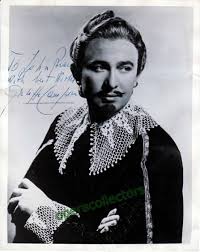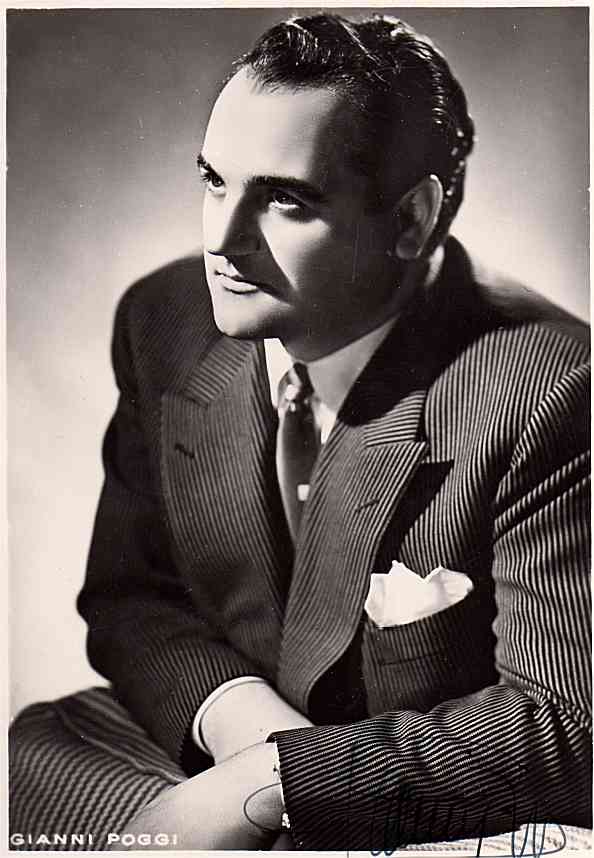|
SATURDEE OPRY LINKS 35:
All-Tenors Edition
 
Giuseppe Campora
Gianni Poggi
Saturdee Opry Links Overture!
"Semiramide," by Rossini. (As opposed to
full-blown ramide, of course.)
https://www.youtube.com/watch?v=WXP79dH4DHM
1.
As Saturdee Opry Links opens to riotous applause, here is
the world's shortest great aria, or the world's greatest short aria, "Amor ti
Vieta," from "Fedora," by Giordano. Sung by Jussi Bjorling.
Setting: a party at Fedora's house, Paris, France, late 19th century
Synopsis: Fedora has found out that Count Loris killed her fiance and swears to
avenge his death. As the first step in her plan to capture Loris, she goes to
Paris and attempts to get him to fall in love with her. Later, they are at a
party at Fedora's house and he tells her that he truly loves her.
https://www.youtube.com/watch?v=sC2NTbm4AEs
Translation:
http://www.aria-database.com/search.php?individualAria=1123
2.
In our
all-tenor edition today, here is Mario del Monaco, the man who could not sing
quietly, with "Un di, all'azurro apazia," from "Andrea Chenier," by Giordano.
Live on stage in 1961. As some of you know, this is one of my favorite arias,
and scenes---and it is based on fact (the real Chenier, a humanitarian poet, was
guillotined during the Reing of Terror.) In it, the poet, Andrea Chenier, is
asked by aristocracy to recite some verse for their amusement, at a party.
Chenier, incensed, recites (sings) verse that denounces the aristocracy,
champions the plight of the poor.
https://www.youtube.com/watch?v=M7xcDnyri0s
Setting: The Ballroom in the Coigny's château
Synopsis: The Countess has asked Chénier to recite a poem but he refuses untill
Maddalena asks him. He contrasts the beauty of nature with the evilness and
misery created by man. He denounces those in authority as self-serving.
Translation:
http://www.aria-database.com/search.php?individualAria=49
About the real Chenier:
https://en.wikipedia.org/wiki/Andr%C3%A9_Ch%C3%A9nier
3.
Before Giuseppe di Stefano smoked, drank, and "womanized" his voice into a shell
of its former self, he was something wonderful. (Maria Callas thought him
wonderful, anyhow, and she preferred to sing with him, no matter the state of
his voice.)
Here he is at his wonderful best, with the tremendous Verdi aria, " Parmi veder
le lagrime," from "Rigoletto." "I can almost see her tears. . ."
Synopsis: Discovering that someone has abducted Gilda after he seduced her, the
Duke of Mantua sings of his allegedly broken heart.
https://www.youtube.com/watch?v=43yfT5djtlQ
Setting: A room in the Duke's palace
Synopsis: Discovering that someone has abducted Gilda after he seduced her, the
Duke sings of his unhappiness that someone has taken his "beloved" away.
Translation:
http://www.aria-database.com/search.php?individualAria=264
4.
"I still cut my way/ through the furious sea/ defying the rage of heaven and
hell. . ." Well. That's determination. Here, from Verdi's "Il Ballo in Maschera,"
one Riccardo vaingloriously proclaims that nothing will keep him from returning
to the sea. Listen to the way the aria builds to bluster. . .Carlo Bergonzi does
the honors.
https://www.youtube.com/watch?v=3mxuRBsAKLU
Setting : Ulrica's hut near Boston, late 17th century
Synopsis : Awaiting his fortune to be told, Riccardo arrogantly proclaims that
nothing can keep him from the sea or the woman he loves.
Translation (search for "fedele"):
http://www.murashev.com/opera/Un_ballo_in_maschera_libretto_English_Italian
And here is the somewhat unduly eclipsed Bergonzi doing the same aria, live on
stage in '67:
https://www.youtube.com/watch?v=rL6WwV1pf6M
5.
Familiar aria, unfamiliar tenor. One Giuseppe Campora with "E Lucevan le Stelle,"
from Puccini's "Tosca." Rich, powerful voice, a bit on the dark side---and
steely in the upper register. A noble rendition of a noble aria. "And the stars
were shining. . ."
Synopsis: On the night before his execution, Cavaradossi trades his last
possession, a ring, to get a guard to take a letter to the imprisoned Tosca. As
he writes the letter, he sings of his love for Tosca and for life.
https://www.youtube.com/watch?v=EQVxSy9ZS0Y
About Campora:
http://www.operavivra.com/artists/tenors/giuseppe-campora/
6.
From "La Favorite," by Donizetti, here is a favorite aria: "Spirito Gentil,"
intoned here by Joseph Calleja, something of a favorite tenor these days. (Yes,
SOL does occasionally post recordings by living singers.) The Maltese tenor is
quite the recording star, it seems, going strong at the "young" age of 40. A
fine rendition, but I will always have a soft spot for Gigli's more tender
version. "Gentle spirit, you once shined in my
dreams. . ."
Synopsis: Not knowing that Léonore is the "favorite" of King Alphonse, Fernand
asks the king for her hand in marriage and receives it because he has led
Castile to victory in battle over the Moors. Thinking that his bride is pure, he
prepares to marry her. However, before she appears, he finds out that she has
been the lover of the King. With his heart broken, he returns to the monastery
and mourns for the betrayal of his love and the loss of Léonore.
https://www.youtube.com/watch?v=WtOlUNdC11o
Translation:
http://www.lieder.net/lieder/get_text.html?TextId=23995
And here is Gigli's recording of the same aria:
https://www.youtube.com/watch?v=W4YUYL6Stoc
7.
The tenor of today's Saturdee Opry Links edition is tenorial. That is, we are
featuring all tenors. When one thinks of Puccini's comic opera, "Gianni Schicchi,"
one always thinks of poor "O Mio Babbino Caro," all but destroyed by "iconic"
poisoning in film and car commercial. One does not often---well this one,
anyhow---think of this stalwart aria, "Firenze e come un albero fiorito," here
sung by the somewhat forgotten tenor, Gianni Poggi. Gianni sings "Gianni." (And
yes, you'll hear a touch of "O Mio Babbino Caro" in the orchestra.)
Setting: The bedroom of Buoso Donati, Florence, Italy, 1299
Synopsis: After telling his family that he has called for Gianni Schicchi to
help them regain their inheritance, he proceeds to sing them a noble song which
extolls the virtues of Florence and that Gianni Schicchi embodies all of them.
https://www.youtube.com/watch?v=_n4aNs33wK4
Translation:
https://iansidden.com/2010/05/avete-torto-from-gianni-schicchi/
8.
I am a fan of the irrepressible Vittorio Grigolo. His exuberance, antic nature
are gifts to the operatic stage, along with the voice. (Thank goodness his
burgeoning career racing Pre-3000 Formula cars was derailed by an accident.)
When Vittorio was nine, his mom took him for an eye exam, and, the story goes,
heard someone singing in the next room, and burst into "Ave Maria." The other
singer, the optician's father, insisted that the kid get an audition with the
the Sistine Chapel Choir. Grigolo, whose voice has a little of the dark
character of Pavarotti, also has a successful career as a pop singer, by the
way. Here he is with "M'appari" from "Martha," by Flotow.
https://www.youtube.com/watch?v=3x0eoYRBKyE
Setting: A hunting park in Richmond Forest, England, 18th century during the
reign of Queen Anne
Synopsis: After meeting Lady Harriet the night before disguised as "Martha",
Lionel sees her again with the ladies-in-waiting for Queen Anne. He is struck
again by her beauty and grieves that he will probably never be with her again.
Translation:
http://www.aria-database.com/translations/martha15_mappari.txt
9.
In the famous "Lamento di Federico," just what is Federico lamenting? Take a
wild guess. If you guessed "unrequited love," you know a great deal more about
opera than you might have supposed. He is rather in love with a "L'Arlesiana,"
or "woman from Arles," the whole thing being based on a short story by Alphonese
Daudet. Here is Beniamino Gigli with the lament, also known as "E la solita
storia," from "L'arlesienne," by Cilea.
Setting: on the banks of Vacares pond in the region of Camargue, the end of May,
late 1800's, Italy
Synopsis: Federico has run away from home after finding out that his beloved
girl from Arles has betrayed him with the stable boy. He is found by Baldassarre
and L'Innocente but the former leaves to tend the flocks and the latter falls
asleep. As L'Innocente falls asleep, he mentions a line from a story told
earlier about a goat. This comment sets off Federico and he despairs over his
lost love.
https://www.youtube.com/watch?v=vPcdylrn8Gg
And a clip from 1940, when he was past his prime:
https://www.youtube.com/watch?v=j2VqnmQeFtM
Translation:
http://www.aria-database.com/search.php?individualAria=1119
FINAL BOW:
In Boito's "Mefistofele," Faust, at one point early in the opera, declares his
love for, and faith in, the goodness of the world. No wonder he quickly goes to
hell, almost literally. Hard to imagine him having faith and love for "goodness"
in today's world. Here is that aria, sung by Giuseppe Campora. "Dai Campi, Dai
Prati." "From the fields, from the meadows."
https://www.youtube.com/watch?v=lIIPZM_vYNw
Rough Google Translation:
https://www.google.com/search?q=transalte&ie=utf-8&oe=utf-8&client=firefox-b-1
Saturdee Opry Links Encore.
"What a wonderful thing is a sunny day. . ." Aureliano Pertile.
https://www.youtube.com/watch?v=AAgcCdT6h40
Back to Opera Links
Back to Home Page
|



